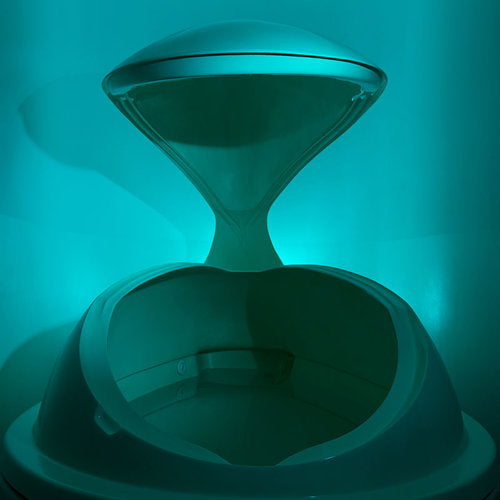It’s not easy to find absolute peace and quiet, especially when our phones go off every two minutes. Our senses are so bombarded by light, sound, taste, smell, and even gravity that it’s hard to center ourselves and hear our own thoughts.
When I need a moment to retreat and be alone with myself, I turn to floatation therapy. Some places also call it sensory deprivation therapy, as you’re completely in the dark, floating, as if gravity doesn’t exist. If you watched Stranger Things, then you’ve seen Eleven do a version of float therapy on season one.
Of course, her experience with a sensory deprivation tank was a bit dramatic — I promise it’s not that scary in real life! In fact, flotation therapy can actually have several benefits for your body and mind. Let’s discover what float therapy is, why it can be good for you, and how to make the most of your time spent in sensory deprivation.
What Is Float Therapy?
While floatation therapy sounds a little intense (and the experience itself can be quite profound), the premise of floatation therapy is simple. Float centers offer pods or tanks filled with body temperature water, mixed with 1,000 pounds of Epsom salt in a soundproof, lightproof tank or pod. This salt mixture provides tons of buoyancy, letting you float effortlessly by simply laying down with your belly up.
As you float, there is no light, sound, or external simulation whatsoever. The idea is that by floating and depriving your senses of stimuli, you can be alone with your thoughts and center yourself.
Hopping into a dark, silent tank full of salt water might sound a little far-fetched, but science backs up sensory deprivation. In 1954, neuroscientist John C. Lily developed the first isolation tank and he and his colleagues found that it helped relieve stress and provide mental clarity. Although some studies on the benefits of float therapy are ongoing, there are proven health effects.
Float Therapy Benefits
The two biggest benefits of flotation therapy are stress relief and mental clarity. Floating with sensory deprivation can alter your state of mind, helping you better understand your own thoughts and shed fears from life’s daily distractions.
In addition to stress relief, float therapy is proven to have the following effects:
- Relieve anxiety
- Lower fatigue brought on by insomnia or jet lag
- Stimulate creativity
- Accelerate learning
- Foster deeper meditation practices
- Soothe chronic pain related to arthritis, fibromyalgia, inflammation, and tendonitis
- Reduce tension in the muscles caused by sitting for long periods
- Lower blood pressure
- Strengthen the immune system
Soaking in warm water with Epsom salts also has positive effects on the skin, helping the body to better absorb magnesium. The experience of float therapy is not only great at soothing sore muscles, relieving chronic pain and speeding up the body’s healing process, but it also provides emotional relief. Our body’s stress hormones like cortisol and adrenaline are lowered while our body produces more epinephrine. It’s like pressing a reset button for our minds and bodies!
How to Make the Most of Sensory Deprivation Tanks
Fair warning, it can be a bit intimidating to be alone with only our thoughts in a silent, pitch black bath. For some people, the idea of being completely alone like this isn’t enticing at all! But once you become accustomed to it, the numerous benefits of float therapy easily outweigh any initial worries you might have.
The first time I tried it, I’ll admit I was taken aback. I felt my mind racing faster and faster as there was nothing to drown out my thoughts. But once I became more mindful of my breath and my body, I found that I was able to experience a deeper meditation. I was able to simultaneously let go while enjoying greater mental clarity.
Because self-care to me means putting myself first, being entirely alone in a float pod helps me reconnect to myself. I always feel so re-energized and completely calm and relaxed, and I find that I’m able to sleep better for a few days! Because floatation therapy acts as a reset button and has positive impacts on sleep, I’ve actually found it extremely beneficial after traveling, helping my body adjust to jet lag.
What to Expect at a Float Center
Types of sensory deprivation chambers vary based on where you go. Generally, however, they have suites with large tubs, big enough to accommodate one person. If you are someone prone to claustrophobia, try to find a float center that has large rooms for you to float in, rather than tanks.
Before you get into the salt water solution, you may have to wash off any oils or lotions in your hair or on your skin, to fully prepare you to shut out the outside world. The staff at the float center may also make a few supplies available to help you deal with the salt water (such as petroleum jelly to put on cuts or scrapes you have).
You can choose whatever time of day the float center is open, and when you think you would get the most out of it. I’ve noticed that I get more out of it if I go in with an intention as well. Especially if it’s your first time, setting an intention can help keep your mind from racing like mine did the first time I tried float therapy!
I have a few more tips for first floaters:
- Avoid having caffeine prior to your float session
- Eat a small meal or snack 60-90 minutes beforehand but avoid a large meal
- Use cold water to wash off before getting in the float tub, to help make the warm water feel more relaxing
How to Do Float Therapy at Home
Going to a float center helps you make the most of the experience, because the staff have worked to ensure outside distractions don’t exist while you float. But if you can’t make it to a center for flotation therapy, you can emulate its calming and restorative effects at home. When I’m not able to get to a center for a float session, I take a bath with my favorite salt mixes. I obviously don’t add enough salt to be able to float in my bathtub, but it’s still a calming way to unwind after a long day. It’s also a good environment to put yourself into if you want to re-center.
Float Therapy and Self-Care
Flotation therapy is a great way to show yourself some love, and relieve the stress you feel in your daily life. I definitely recommend it if you feel like you need time to yourself, or to recover either physically or mentally.
Have you tried floatation therapy before? What was your experience like? Let me know in the comments!
XOXO,
Serena
by





